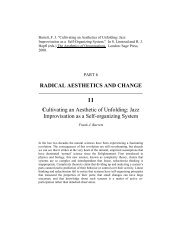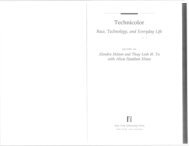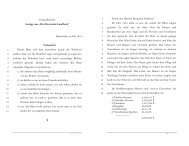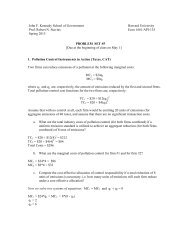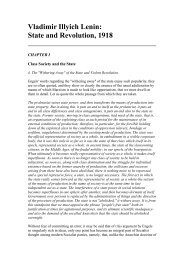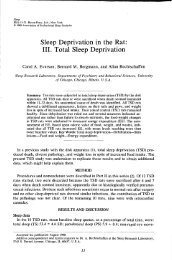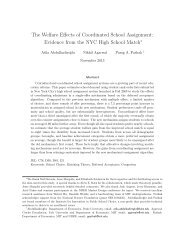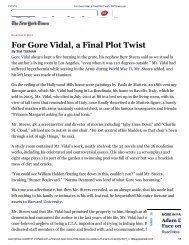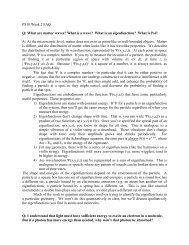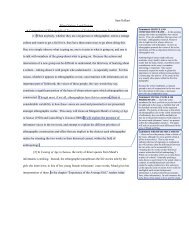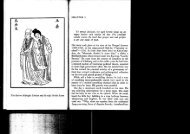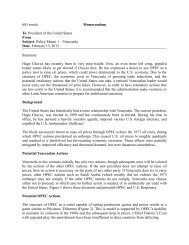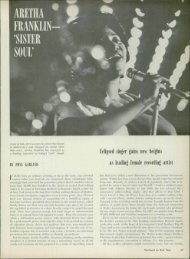Genes Impact Environment - WSJ.pdf - iSites
Genes Impact Environment - WSJ.pdf - iSites
Genes Impact Environment - WSJ.pdf - iSites
Create successful ePaper yourself
Turn your PDF publications into a flip-book with our unique Google optimized e-Paper software.
Parents Can Counteract<br />
'<strong>Environment</strong>s' Created<br />
By Children's <strong>Genes</strong><br />
IGMZTND FREUD had been dead for four<br />
S years before a scientist proved in 1943 that<br />
DNA carries genetic information. It was probably<br />
just as well. The founder of psychoanalysis<br />
-mlv would have rolled ovei in his erave if<br />
he'd-sen how the genetic revolutionblayed out<br />
when it comes to understanding human behavior.<br />
As tough as neuroscientist~have been on<br />
Freud-replacing his quaint notions of ego and<br />
id with neumtransmitters and brain circuits-geneticists<br />
have struck the unkindest blow. linkine<br />
depression, neuroticism, impulsivity, sexual orir<br />
entalion and more to people's 25,OW or so genes.<br />
The comolieated taoeitrfof the mind wowin bv<br />
heud, a respected ne&<br />
scientist in his day, has<br />
been reduced to a fourletter<br />
genetic code.<br />
But when it comes to<br />
child development, Freud<br />
is back. Or at least psychoanalysts<br />
and their focus<br />
on interactions between<br />
parents and children<br />
are, and in a way<br />
that few foresaw. The<br />
childhood experiences<br />
that so riveted Freud affect<br />
the expresdon or sup<br />
pression of gene-based<br />
personality, traits for a<br />
fascinating reason: <strong>Genes</strong> creak! environments.<br />
"We analysts actually have a place at the table<br />
of genetics," David Reiss, dimtor of psychiatric<br />
research at the George Washington Univemity<br />
Medical Center. told the annual meetine of the<br />
Amencan Fxyehoanalytlc Asscoation l&t month.<br />
He is leading an ambltlous study of 310 (so<br />
far) adouted children. He and colle-mes are.<br />
fir& idintifymg whether the adoptez habies'are<br />
bubbly and all smiles, or solemn and dour. Next,<br />
thev ire observine how the adoutive oarents respoi~d<br />
to the childien. This respbnse k the "eWronment"<br />
the babies' (presumably) gene-based<br />
traits create. The goal is to see wktkr the parental<br />
response alters expmsion d,- traits<br />
oosition. Others seem conwnitaliv crankv. refus-
~<br />
U .,LC pqcuIO OLG ,","Dl DUODI. *-. -<br />
a very teal sense, the chid's innate di<br />
on-solemnity-elicits a certain ~arental sib!<br />
havior-harshness and lack of wanith. Gen<br />
in other words, create an environment. This<br />
two punch cam lead to the worst outwme, sa Ps<br />
Wz;.&iss.. S-es hint that when solemn babies<br />
reactr~@do~,~,. they bavb a greater. chance of<br />
de7ielopfig eonpu@;~sorders, especially oppmitionalbehm-or;,Tliese%re<br />
me kids who become<br />
bullies and mbw. They also have a higher<br />
risk of anxiety ilisorden, which em pave the<br />
wav to denression and substance abuse.<br />
-BU~ the' new research suggests that none of thls<br />
b&$+&.h& is inev%ahie. If parents renst responding to a dow<br />
, e~s, says' tk.Giss, the genes<br />
a t @herlie sole@iQ,Q:infancy and opposition&l,, , ..:<br />
beyqor in th$&nny+ my;@ qMet,.. , , d:,<br />
<strong>Genes</strong> seem to create enviroriments throuehout<br />
life. An uluesponsive child elicits less afkction<br />
from parents, reinforcing her innate lack of<br />
soeiahilitv. Imwlsive. amesiive kids elicit<br />
threats a6d cokeinn, reGforcing problem behav-<br />
ior. On a happier note, a sociable and verbal<br />
child is a d a t to talk to and read to. reinforcing<br />
his inherent cqitive edge. '.We're taking<br />
ahnut the genume aq a product of soclal interac.<br />
tions," says Dr. Reiss. "<strong>Genes</strong> ale fully ex-<br />
pre@ in some social environments, while in<br />
others they never get expressed."<br />
llAT IS A fundamentally hopeful message,<br />
T because it suggests that genes are not destinv.<br />
Yes. a toddler's innate dourness will elicit<br />
a ferndin' response from even the best-intentioned<br />
parents. But if parents understand that<br />
this instinctive resoonse is the verv environment<br />
that can reinforce a genetic tendency, they have<br />
an incentive to respond differently. Studies find<br />
that&- narents videos of their cold. imnaiiedor<br />
angiy responses-and offemg coaching<br />
lnhow to w n d less harshly-helps many<br />
change, b4kjiibb the link frob inf&t.te~p$&~.,;<br />
~. . .. .<br />
ment to ado~e6Wntrouble. ' .*,.<br />
, , '" ,"~..<br />
Gene al$o &&an-environment whenhi '. '.<br />
child's oppasitional, aggressive b*avior breeds J ~<br />
marital wnfliet. That environment! tlienindukes . ,<br />
stronger expression of the problematic:fraitS, ~<br />
raisiie the child's risk for academicand hehaw .'<br />
iom problems in adolescence. "Kids are contributing<br />
to the creation of an environment Ulat<br />
then affects them." says psychology resycher<br />
Tom O'Cunnor of the University of Rochester.<br />
Attribuling adolescent problems lo the inexorable<br />
force of genetics may be appealing (it lets<br />
narents off the hook). but imores the role of<br />
&ily ennronment,&hich is far from inevitable.<br />
Says Prof. O'Connor, "The family enviwnment<br />
has been wrongly downplayed."<br />
"If these fmangs hold up," adds Dr. Reiss,<br />
"it would provide an opportunity to forestall genetically<br />
influenced adverse outtomes. If you<br />
can alter the parent's responses, these genes<br />
might never express themselves. When I say<br />
that analysts ilave a plase in genetics, I mean<br />
that they have a iieep agpreciation of the impor-<br />
- ~<br />
:<br />
tance of relationshi~s in shaping Deoule."<br />
Frrmd. who woujd have &ijO this year, is<br />
WIy smiling down £rum his couch in We clouds.<br />
I'<br />
- -... .-



